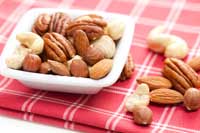Weight Gain After Menopause
If you talk to many elder women, 50-something or older, it will take a short while for you to realize that menopause and weight gain seem to go hand in hand for most of them. They often complain about that.
What they don’t usually understand is why now they’re gaining weight in different parts of the body, typically the stomach area, even though they may have noticed it mostly in their hips when they were younger.
Hormonal changes contribute greatly to it, although it is still a mystery in some areas. The body stops producing estrogen when a woman reaches menopause and stops ovulation.
Low estrogen has caused weight gain in laboratory animals and it can be fairly safely assumed that this is why the female body changes shape. During childbearing years, fat is stored in the lower body. After menopause, women store more fat in the abdomen, just like men. The danger of abdominal fat is a greater risk of heart disease.
Furthermore, both men and women lose muscle mass as they get old, unless they have regular exercise that includes strength training, and the metabolism slows down. If you do not change your eating habits, you are bound to gain weight. At 50 or 60, you need fewer calories than you did when you are 30 or 40.
Hormonal therapy is one solution to control some of the side effects of menopause. It does not cause weight gain, contrary to what you may have heard. Water retention and subsequent bloating may occur, but this is normally a temporary condition, and it does not mean added fat. But a debate still rages around hormone therapy, because some studies show an increased risk of breast cancer linked to the use of hormone therapy.
So does this mean that you just have to accept being fat at fifty? Definitely not! There are things that you can do to minimize the effects of menopause and weight gain that don’t include hormones.
1. Don’t stop eating. Just make better choices. Eat the foods you know are good for you as part of a low fat diet. Get plenty of fiber and stay away from sugar and refined flour products.
2. Exercise regularly. Your metabolism is not the only thing that slows down as you age. Work is often less demanding physically, you’re not running around chasing kids, your vacations are probably not as active as when you were younger, and in general you just do things a bit more slowly than before. You’d be amazed at what just 30 minutes of moderate activity every day will do for you.
3. Maintain your muscle mass by lifting hand weights or adding ankle weights when you walk. Of course, you should check with your doctor first before starting any exercise program if you’re currently being treated for any medical conditions.
4. Love yourself. Even if you’ve put on a few pounds and your waist is thicker than it used to be, try to be okay with that. Like Mammy told Scarlett in Gone with the Wind, “You ain’t never gonna have an 18 inch waist again!”. Accept that and appreciate your life.
Another way is to use my Weight Loss Breeze Program. It contains simple exercises that take only a few minutes a day to do and makes losing weight at any age a breeze.
About the Author: Christian Goodman is a famous Alternative health researcher and the creator of the Health Blog. His latest work is the Weight Loss Breeze Program , which has now helped thousands of people to reduce weight naturally.
-
3 BIG Secrets of Losing Fat
On any given day you go to the gym and y
-
My Story: “The Ability To Get Back Up After You’ve Fallen Is Key”
Alicia wasn’t extremely overweight and nobody tol
-
The Dangers of Working Out Too Much
People start working out for many different reasons; some begin
-
How to shed Belly Fat
If you’re thinking on the way to lose belly fat right now, that
-
The Only Weight Loss Cure Known To Man - How it Will Ignite Explode and Revolutionize Your Results
It would blow you away if you really knew just how simple it was to
-
Some Straight Talk About LowCarbohydrates And Your Health
There have been many diets and weight loss plans that have come and go
- DON'T MISS
- Weight Loss Reviews
- Popular Reasons To Choose Fitness Ebooks
- Quick And Healthy Weight Loss - How To Lose Weight Fast
- Lose weight with exercise
- How Did The Housewife Accomplish It
- A Shot At Fast Weight Loss Injections
- Dieters Are You Feeding Your Inner Rebel
- Five Secrets To Weight Loss
- Regain control over your life with Didrex
- Slimming - What's The Real Deal?




